Mar 21 2018
An audiologist from the UK’s leading tinnitus clinic is urging sufferers to seek support after a study has revealed considerable regional variation in tinnitus service provision across the UK, particularly in the availability of psychological treatments.

Mark Williams, Chief Audiologist at The Tinnitus Clinic Ltd, conducts a hearing test
The study – based on a survey conducted by the British Tinnitus Association (BTA) – revealed that only one in 40 are able to access psychological services for tinnitus, despite an evidence base that suggests psychological treatments are one of the most effective management strategies.
According to the study, one-fifth of patients reported that at initial consultation their GP did nothing, and two-thirds of people referred for diagnostic services in secondary care were then discharged without any therapeutic intervention.
A further one in eight people were referred from primary to secondary care, discharged and then re-referred to secondary care, creating, as the report states, ‘expensive and unsatisfactory revolving door healthcare’.
Chief Audiologist at The Tinnitus Clinic, Mark Williams, said:
In comparison with most other countries, the UK has well developed nationwide tinnitus services. However, these findings worryingly show that people are going through disappointing experiences when they seek help.
We often see patients who have been told by their GP that nothing can be done, and this can be very upsetting and distressing – particularly for people who find the condition is already impacting on their mental health.
Particularly concerning are the findings around the lack of psychological treatments. Some of the psychological disorders associated with tinnitus, which is often described as a ‘ringing in the ears’, are anxiety, depression and insomnia. The condition can leave people feeling isolated, so being passed from person to person within the healthcare system and with little psychological support, can lead to problems building up.
A patient recently treated at The Tinnitus Clinic in Leeds, Dr Peter Draggett, had been told by his GP that “there was no treatment available” for him. This frustration led him to finding The Tinnitus Clinic and, following treatment, Peter says his tinnitus “has effectively disappeared now”, adding “it was a relief to know there were other options out there”.
Around six million people in the UK are affected by tinnitus, many of them to a disabling degree, and this number is increasing as the population ages and younger people are exposed to loud noise through excessive earphone use and recreational noise.
Mark added:
At The Tinnitus Clinic, we work hard to relieve pressure on the NHS in any way we can. We offer exclusive, evidence-based tinnitus treatments at our clinics throughout the UK which are individualized to the persons’ tinnitus, lifestyle, approach and response to treatment.
I would say to anyone suffering currently, don’t give up. There are treatments that can help so seek support and get in touch.